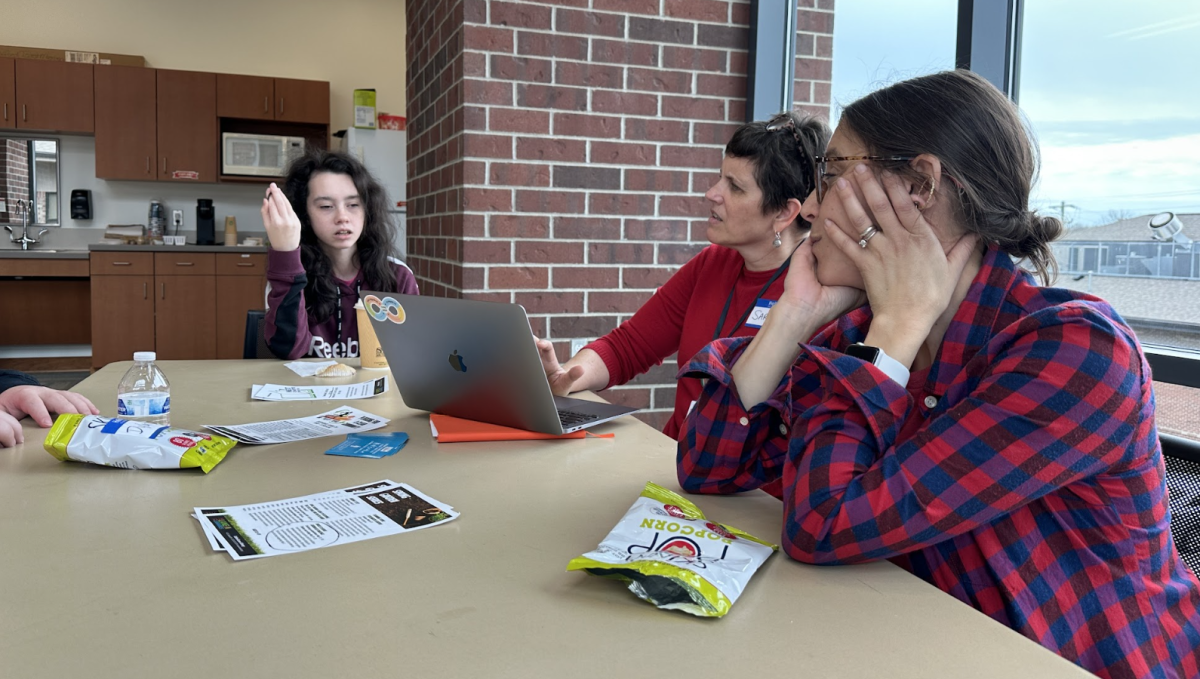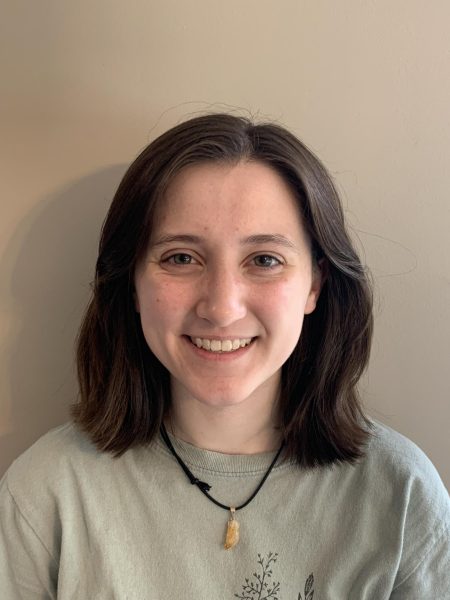It’s 1 p.m. Thursday, March 27, in the Havighurst Meeting Room at Oxford Lane Library. “The Next Chapter: Book Club” is about to begin its meeting.
Sarah Gifford, a public services librarian at Oxford Lane Library, sets up the audiobook on her laptop. The group started listening to “The Wild Robot” by Peter Brown at their last meeting.
They were previously reading “Something’s Brewing: Short Stories and Plays for Everyone” by Jillian Ober and Tom Fish, which is a collection of stories about navigating adulthood while having a disability. But they recently decided to switch things up and try out audiobooks.
Dylan and Emaralys, two students from Talawanda High School (THS), return to the table with their chosen snacks and drinks: Dylan with a small “Skinny Pop” popcorn bag and water and Emaralys with coffee and a muffin. Catherine Mabis, an educational assistant and job coach, sits next to Dylan, and Jennifer George, an Intervention Specialist, sits across from her next to Gifford. Both work at THS alongside Grade23, a program that allows adults with intellectual and developmental disabilities to continue going to school until they’re 22 years old.
Gifford presses play, and chapter two streams out of the device’s speakers.
The chapters are fairly short, allowing the group to get to chapter nine by the end of the hour. After each section, the group comments on what happened in the story, with Gifford and George finding ways to relate the plot back to real life. Emaralys smiles at the mention of otters, and Dylan talks about what he’d do if he found a robot.
“The Next Chapter” is a book club for adults with intellectual and developmental disabilities, though anyone, regardless of reading or ability level, can participate. It’s more of a place for these adults to socialize and make friends, all while being at the library and learning what it has to offer.
“It’s a good social thing, and it also would increase their knowledge of the library, which … is really important to all people,” George said. “ … Just being in the library makes you realize how much the library has to offer, which is good for my population of students and for adults with disabilities.”
Gifford learned about this club through the American Library Association’s (ALA) website called Programming Librarian. She said she wasn’t sure how to start the club and she didn’t have the right experience, but she knew there were people who would want this.
“Sometimes you just have to take a risk and do something … I was willing to do that,” Gifford said.
She said she felt she didn’t have the right experience but was able to go through training offered by ALA. Rebecca Smith, the branch manager at Oxford Lane Library, got Gifford in touch with George, as George could bring students from Grade23 to meetings.
Gifford hosted the first meeting on Sept. 13, 2024. The group has seen students from THS attend, as well as people from Hamilton and Middletown who heard about the club. During the spring, the group met biweekly from 1 p.m. to 2 p.m. on Thursdays and once-a-month on Tuesdays from 6:30 p.m. to 7:30 p.m.
George said this program is important because it provides a local resource for adults in Oxford, when most things are farther out.
“I always feel like there aren’t a lot of opportunities that are made just [for] adults with disabilities that are like students like mine, and this is something that everybody can access, and … in every ability,” George said.
The club will take a break for the summer. Gifford said she hopes the program can continue but will need a higher attendance rate to do so.
“There are plenty of adults with intellectual and developmental disabilities [in Oxford] who would really benefit from this … I want to provide that here, but we’re going to have to start getting some more people here if we’re going to continue it,” Gifford said.
Attendance can depend on numerous factors, mainly illness and access to transportation. If a member is ill or wants to avoid illness due to medical reasons, or if a member’s caregiver can’t bring them, that can decrease attendance numbers dramatically.
Gifford said the program has been extremely rewarding, both for those who attend and those who put it on.
“I think it’s great for not only the adults that are here as patrons, but it’s good for us who are working with these adults with developmental and intellectual disabilities,” Gifford said. “I’ve gotten as much out of it as I think the participants, and I would love to see the [circle of friends] grow for them.”








